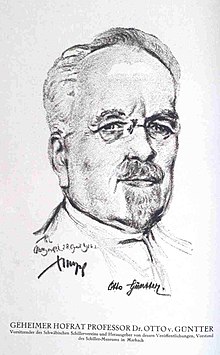Otto Güntter

Otto Güntter (born October 30, 1858 in Stuttgart , † March 30, 1949 in Marbach am Neckar ) was a German specialist in German and director of the Schiller National Museum .
Life
Otto Güntter was the son of Karl Friedrich Güntter (1827–1873) and Mathilde Kidaisch (1833–1899). Influenced by Friedrich Theodor Vischer , he studied philosophy , German and modern philology in Tübingen and completed his training with a study visit of several years in France and England. Impressed by the exhibitions of the British Museum and the National Portrait Gallery in the South Kensington Museum , he organized a large exhibition of manuscripts, portraits and prints by Swabian poets on the occasion of the 4th German New Philology Day in Stuttgart. This attracted widespread attention and gave the first suggestion to found the Schillermuseum in Marbach am Neckar (sponsor: Schwäbischer Schillerverein ). In 1904, one year after the opening, Güntter was given its management. In the service of this task, for the sake of which he renounced his position as a high school professor and his teaching assignment at the Technical University of Stuttgart, he succeeded in building and expanding the museum into a Swabian poetry museum and at the same time into an archive and library for Swabian people in three and a half decades Literature (since 1922 Schiller National Museum). Firmly rooted in local tradition and personally friends with many Swabian poets, Güntter knew how to win numerous bequests, important manuscripts and correspondence, portraits and books for the Marbach collection and to make them accessible to a wide audience through exhibitions and publications. In his book Mein Lebenswerk , written at the age of almost 90, he describes the history of the museum and gives an overview of the acquisitions and donations from 1904 to 1939 and the entire inventory of manuscripts and portraits. (In 1955, the German Literature Archive was founded within the Schiller National Museum .) - In his academic work, Güntter primarily dealt with Schiller and Swabian poetry. Many first publications and the active promotion of research on Swabian literature are thanks to him.
Awards
- 1904–19 managing director, then until 1939 chairman of the Swabian Schiller Club
- Great Medal for Art and Science (1905)
- Dr. phil. honoris causa (Tübingen 1909)
- Goethe Medal (1934)
- Honorary Senator ( TH Stuttgart 1948)
- Honorary member of the Swabian Heimatbund (1949)
Works (selection)

- Lessing's Philotas and the Poetry of the Seven Years War , Stuttgart: Göschen 1890 (Göschen Collection; 21).
- The Schiller Museum in Marbach , Stuttgart 1906.
- Friedrich Schiller, His life and his poems , Leipzig: Weber 1925.
- Schiller in the Karlsschule , Berlin: Volksverband d. Book lovers, Wegweiser-Verl. 1925 (lover print / Volksverband der Bücherfreunde; 6).
- The portraits of Holderlin , Stuttgart: Cotta 1928 (publications of the Swabian Schiller Club; 12).
- Mörike as a draftsman , Stuttgart a. a .: Cotta 1930 (publications of the Swabian Schiller Club; 13).
- The silhouettes of Luise von Breitschwert for Mörike's Stuttgarter Hutzelmännlein , Stuttgart: Cotta 1932 (publications of the Swabian Schiller Club; 14).
- The Schiller National Museum in Marbach , Stuttgart: Cotta 1935 (publications of the Swabian Schiller Club; 15).
- From classical times, silhouettes by Luise Duttenhofer , Stuttgart: Cotta 1937 (publications of the Swabian Schiller Club; 16).
- My life's work , Stuttgart: Klett 1948 (publications of the German Schiller Society; 17).
As editor:
- Publications of the Swabian Schiller Club, 1905–38:
- Schiller's poems and dramas , Stuttgart; Marbach: Publishing house of the Swabian Schiller Club 1909.
- All of Schiller's works: historical-critical edition in twenty volumes , Leipzig: Hesse 1910–1911.
- House book Swabian storytellers , Stuttgart; Marbach: Publishing house of the Swabian Schiller Club 1911
- House and field book Swabian storytellers , Stuttgart: Grüninger, [1916].
- Collected poems by Christian Wagner , Stuttgart: Strecker and Schröder 1918.
Portraits
- Bronze bust of Jakob Wilhelm Fehrle , 1938 (Marbach am Neckar, Schiller National Museum)
literature
- Bernhard Zeller , On the 100th birthday of Otto Güntter , in: Yearbook of the German Schiller Society II , 1958
- Bernhard Zeller: Güntter, Otto von. In: New German Biography (NDB). Volume 7, Duncker & Humblot, Berlin 1966, ISBN 3-428-00188-5 , p. 279 ( digitized version ).
- E. Lißberger, Württembergische Geschichtsliteratur of the year 1946-1950 . 1952, p. 147
Web links
- Literature by and about Otto Güntter in the catalog of the German National Library
Individual evidence
- ↑ The appointment was made posthumously as part of the 40th anniversary of the federal government on May 22, 1949: Honor roll. In: Schwäbisches Heimatbuch 1949. Ed. By Felix Schuster on behalf of the Schwäbisches Heimatbund. Stuttgart [1949], pp. 176-177, p. 176.
| personal data | |
|---|---|
| SURNAME | Güntter, Otto |
| ALTERNATIVE NAMES | Güntter, Otto von |
| BRIEF DESCRIPTION | German philologist and director of the Schiller National Museum |
| DATE OF BIRTH | October 30, 1858 |
| PLACE OF BIRTH | Stuttgart |
| DATE OF DEATH | March 30, 1949 |
| Place of death | Marbach am Neckar |